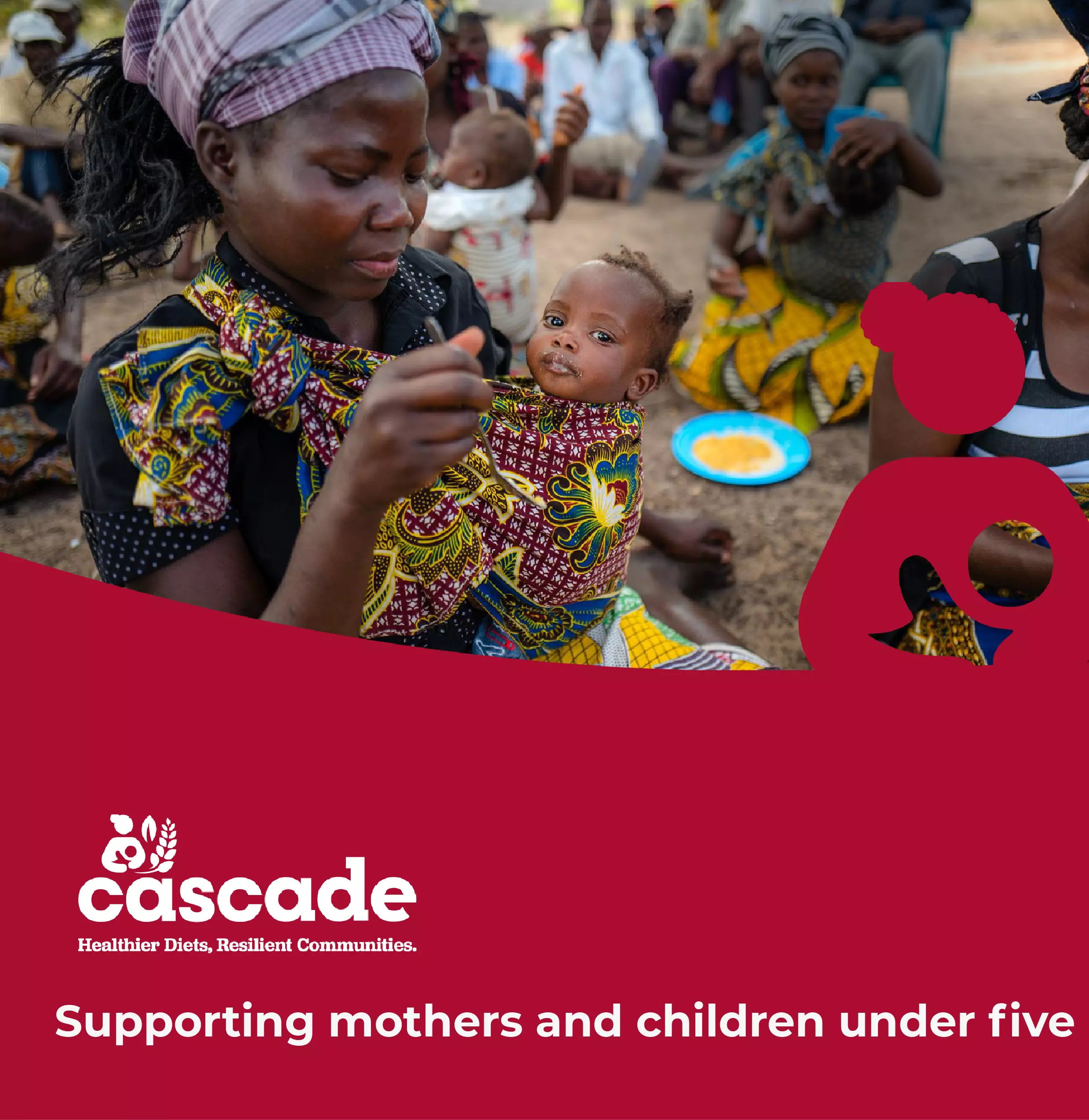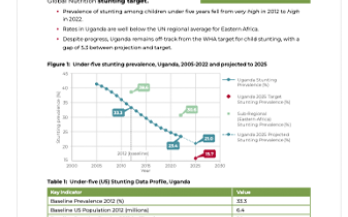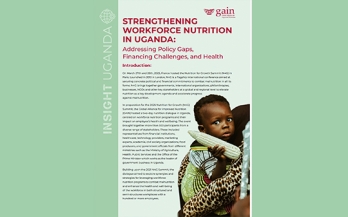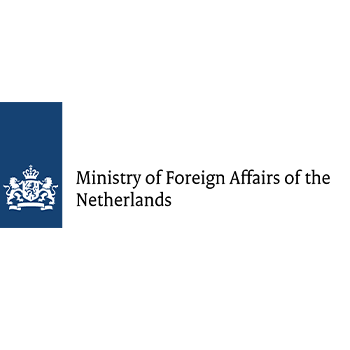

GAIN In Uganda
National Catalytic Stakeholder Consultation on the Review of the Uganda MSME Policy (2015) and the National Standards and Quality Policy (2012)
Healthier Diets for All
Over 3 Million Lives Touched
Through vegetable promotion, SME support, and nutrition programs.
Healthier Diets for All
Fueling Better Nutrition
"Vegetables for All" promotes healthier eating habits.
Healthier Diets for All
Sustainable Food Systems
We scale up fortified foods and promote sustainability.
Healthier Diets for All
Partnering For Impact
We drive change rooted in equity and sustainability.
GAIN In Uganda- Overview
GAIN Uganda, established in 2007, is part of the Global Alliance for Improved Nutrition’s global mission to end malnutrition by improving access to nutritious and safe food. Operating in alignment with Uganda’s Vision 2040 and the Uganda Nutrition Action Plan II, GAIN Uganda addresses the country’s triple burden of malnutrition—undernutrition, micronutrient deficiencies, and diet-related non-communicable diseases.
Through multi-sectoral partnerships and a systems approach, GAIN Uganda focuses on industrial fortification, biofortification, food safety, consumer behavior change, and strengthening MSMEs. The program works closely with government, civil society, and the private sector to create sustainable food systems and ensure affordable, nutritious diets for all, particularly women, children, and other vulnerable groups.

GAIN's Contribution

Uganda has made progress in food production, but many people especially women, children, and low-income communities still face barriers to accessing safe, nutritious, and affordable diets. Malnutrition and diet-related diseases remain pressing concerns.
GAIN is working to close this gap by strengthening Uganda’s food system in partnership with local stakeholders. We support the production and consumption of fortified and biofortified foods, promote dietary diversity, and empower small and medium enterprises to deliver healthier options.
At the heart of our work is a simple but powerful goal: to ensure that all Ugandans, especially the most vulnerable, can enjoy healthier diets and live better lives.
Uganda Faces the Triple Burden of Malnutrition
1 UNDERNUTRITION
Children are the most affected by malnutrition, which harms their future potential and productivity. When it occurs in early childhood, malnutrition causes lasting physical and mental damage.
26%
Stunting
Ugandan children aged 6-59 months are stunted (short for their age)
3%
Wasting
dangerously thin for their height due to severe weight loss.
10%
Underweight
Low weight for their age due to acute or chronic malnutrition.
2 MICRONUTRIENT DEFICIENCIES
Iron and Vitamin A deficiencies remain widespread, particularly among young children and pregnant women, where iron deficiency causes anemia.
60%
National zinc deficiency prevalence. 38.4% of children under 5 years and 60% of pregnant women.
53%
of children aged 6-59 months are anemic.
32%
of women of reproductive age in Uganda, aged 15 to 49 years have anaemia.
3 OVERNUTRITION
Malnutrition affects Ugandan adults through both overnutrition and obesity.
Overweight and obesity prevalence is higher among women with higher education (46%) and in urban areas (14%) compared to rural areas (6%).
9% of men and 18% of women are overweight, while 8% of women and 2% of men are obese
Only 5.2% of Ugandan adults consume the recommended five servings of fruit and vegetables per day
Our Strategy in Uganda
To transform Uganda’s food system by scaling up fortified and biofortified foods, strengthening SMEs, and generating demand for healthier diets while embedding gender equity and environmental sustainability.
Some of the key milestones in Uganda include:
- Since 2007, GAIN Uganda has led impactful interventions including the establishment of the SUN Business Network, supporting over 300 SMEs, and reaching over 3 million people through demand generation and food safety initiatives.
- 427 private sector players trained
- 3,048 engaged in awareness campaigns
Advancing Nutrition By Motivating Ugandans To Consume Safer And Nutritious Foods
GAIN Uganda is committed to improving nutrition outcomes through a comprehensive approach that includes food fortification and biofortification, strengthening MSME supply chains, increasing consumer demand for healthier diets, enhancing food safety, and advocating for effective policy reforms.


CASCADE (2024–2026)
Supporting mothers and children under five through private-sector engagement and policy advocacy.

Vegetables for All (2024–2026)
Promoting vegetable consumption among 118,000+ urban and peri-urban consumers.

SUN Business Network:
Training 427 private players and supporting 300 SMEs.

Research Partnerships: Working with Kyambogo and Makerere Universities.
Partnerships For Improved Action
Reducing malnutrition and improving diets requires engaging with and building alliances between governments, donors, including philanthropists, civil society and youth, producers, academia, UN and development partners, and the private sector to develop and implement new approaches to drive improved action.
GAIN Uganda's Way
- Industrial Food Fortification & Biofortification by enhancing the fortification and biofortification of staple foods to improve nutritional outcomes.
- Development of stronger resilient MSMEs by empowering local businesses to deliver affordable and healthy food options.
- Demand creation for healthier diets by promoting consumer awareness and behaviour change toward nutritious diets.
- Enhancing food safety by improving food safety standards through collaboration and policy advocacy.
- Policy Advocacy and Food System Transformation by driving evidence-based policies to create a sustainable and inclusive food system. Inclusive Gender Mainstreaming and Environmental Sustainability by embedding gender equity and environmental sustainability across programs .
A Message from the Country Director
Welcome to GAIN Uganda
At GAIN, we believe that everyone deserves access to safe, affordable, and nutritious food — especially the most vulnerable among us. In Uganda, our work is deeply rooted in collaboration with communities, government, and the private sector to transform food systems and improve nutrition outcomes.
As we continue to expand our reach and deepen our impact, we remain committed to scaling proven solutions like food fortification, supporting SMEs, and driving demand for healthier diets. Our goal is simple but urgent: healthier diets for all, and a food system that works for everyone.
Thank you for visiting our page and for being part of this journey toward a nourished and thriving Uganda.

Damali Ssali
Country Director, GAIN Uganda
Contact Us
Kampala, Uganda
Plot 9, Kyambogo View Road, Minister’s Village, Ntinda
P.O.Box 800896
Kampala, Uganda
Tel :+256 200 922 02
Email: [email protected]

Uganda Fact Sheet-WHA Global Nutrition Target
- 16/05/2025
WHA Global Nutrition Stunting Target 2012-2025 Achieve a 40% reduction in the number of children under-5 who are stunted WHA Global Nutrition Overweight Target 2012-2025 Ensure that there is no increase in childhood overweight
Strengthening Workforce Nutrition In Uganda: Addressing Policy Gaps, Financing Challenges, and Health
- 09/04/2025
On March 27th and 28th, 2025, France hosted the Nutrition for Growth Summit (N4G) in Paris. Launched in 2013 in London, N4G is a flagship international conference aimed at securing concrete political and financial commitments to combat malnutrition in all its forms. N4G brings together governments, international organisations, philanthropies, businesses, NGOs and other key stakeholders at a global and regional level to elevate nutrition as a key development agenda and accelerate progress against malnutrition. In preparation for the 2025 Nutrition for Growth (N4G) Summit, the Global Alliance for Improved Nutrition (GAIN) hosted a two-day nutrition dialogue in Uganda, centred on workforce nutrition programs and their impact on employee’s health and wellbeing.
Existing Workforce nutrition policies in Uganda and opportunities for improvement
- 11/05/2023
Uganda is a low-income country in which 41% of the population lives below the poverty line, and where about 82% of the population cannot afford a healthy diet. There is a continued need to engage all actors and options to address the malnutrition burden the world faces.
Fortified Foods Are Major Contributors to Apparent Intakes of Vitamin A and Iodine, but Not Iron, in Diets of Women of Reproductive Age in 4 African Countries
- 13/06/2020
Food fortification is implemented to increase intakes of specific nutrients in the diet, but contributions of fortified foods to nutrient intakes are rarely quantified.
Complementary feeding gaps and affordability in Eastern and Southern Africa: new evidence from the RISING project
Poor quality diets for young children after they stop exclusive breastfeeding is a major nutrition challenge in many countries. If the complementary foods provided to young children lack essential proteins, vitamins and minerals, it can hinder growth and development and make them vulnerable to illnesses.
Development of simplified dietary assessment tools to inform the design of nutrition interventions
The goal of this study was to develop and test two methods of quantitative dietary assessment that are less technically challenging and less expensive to implement than the standard 24HR dietary recall procedure, but still capable of identifying nutrient gaps with acceptable precision.
Development of simplified dietary assessment tools to inform the design of nutrition interventions
- 01/09/2017
The goal of this study was to develop and test two methods of quantitative dietary assessment that are less technically challenging and less expensive to implement than the standard 24HR dietary recall procedure, but still capable of identifying nutrient gaps with acceptable precision.
The 2008 Uganda food consumption survey: Determining the dietary patterns of Ugandan women and children
- 01/05/2010
The Uganda Food Consumption Survey was undertaken to provide the critical body of evidence that policy makers and program designers need to make informed decisions about effective investments to reduce deficiencies of vitamins and minerals in Uganda.










